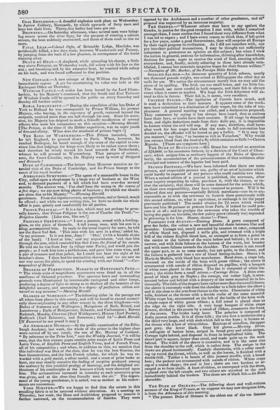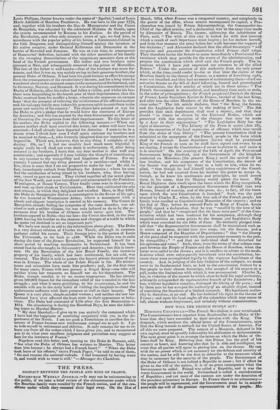THE DUKE or Ontr ws.—The following short and well-written account
of the King of France, as we suppose we may now designate him, is from the Atheneum of this morning.
"The present Duke of Orleans is the eldest son of the too famous Louis Philippe, (better ,knownunder the name of Egalite,') and of Louis Marie Adelaide of Bourbon Penthievre. " He was born in the year 1773, and, together with his brothers the Due de Montpensier and the Count de Beaujolais, was educated by the celebrated Madame de Geniis, upon the system recommended by Rosseau in his Emilius. At the period of the Revolution, and when only nineteen years of age, we find him, in accordance with the popular policy of his house, a Lieutenant-Colonel in the 14th Dragoons, and distinguishing himself against the invaders of his native country, under General Kellerman and Dumouriez at the battles of Nerwind and Jemaune. He was at this time, in consequence of Dumouriez' defection, included with the other members of his family in the sweeping denunciations of the sanguinary monsters then at the Lead of the French government. His father and two brothers were arrested at Nice, and subsequently removed to the prison of Marseilles. 'The fate of the father is well known—that of the brothers was more for- tunate, and that it was so, was mainly owing to their generous brother, the present Duke of Orleans. It had been his good fortune to effect his escape froin the consequences of the revolutionary decrees, and for a long time he wandered about under assumed names in the mountains of Switzerland, and in Germany, Norway, and Denmark. It was during his concealment in the Duchy of Holstein, after his father had fallen a victim, and whilst his bro- thers were languishing in the fourth year of their imprisonment, that the Duke received from his motrer a letter, wherein she expresses an earnest hope that the prospect of relieving the misfortunes of his afflictedmother and his unhappy family may induce his generous spirit to contribute to the peace and security of his country.' The object here pointed at was for the Duke to give a pledge that he would leave the continent of Europe for America ; and this was exacted by the then Government as the price of liberating the two princes from their imprisonment. To this letter of his mother, the Duke replied in the following manner.—' When my dearest mother shall have received this letter, her orders will have been executed—I shall already have departed for America. I seem to be in a dream when I think how soon I shall again embrace my brothers and be reunited to them,—I, who formerly imagined that our separation was impossible. Think not, however, that in any thing I complain of my destiny. Oh, no ! I feel too sensibly how much more frightful it might really be—I shall not even deem it unfortunate, if, after being restored to my brothers. I learn that my dear mother is also well and comfortable ; and especially if I may indulge the thought of contributing in any manner to the tranquillity and happiness of France. For my country I cannot feel any thing personal as a sacrifice—and whilst live, there is none that I am not prepared to make for her.' He did, in fact, immediately embark from Hamburg for America ; where he soon had the satisfaction of being joined by his brothers, who, thus having met, vowed to part no more. They visited together all the noted places of tile New World, and were introduced and entertained by the President Wasnington, at Mount Vernon. They finally came over to this country, and took up their abode at Twickenham. Here they cultivated the arts • and sciences, in which they delighted and excelled. Here, in May 1807, the Duke de Montpensier died of a consumption in the flower of his age ; he was interred in Westminster Abbey, where a monument with a classic and elegant inscription is erected to his memory. The Count de Beaujolais, already feeling the symptoms of the same disorder, was ad- vised to seek a milder climate, but was only induced to do so by the as- surances that his brother of Orleans would never quit him The brothers repared to Malta—but too late : the Count also died, in the year .1808. leaving his brother to the chances and changes of a world in which he seems yet destined to act an important part." We have not much to add to the information above given. The Duke is a very distant relation of Charles the Tenth, although in common parlance called his cousin. Their lineage joins in the person of Louis the Thirteenth, so far back as 1540. While the Duke was in exile during the time of the former Revolution, he supported himself for a short period by teaching mathematics in Switzerland. It has been -stated that he also taught in this country and America ; but this is incor- rect. On the Restoration of the late Royal Family, the immense property of his family, which had been confiscated, but not sold, was restored. The Duke is said to possess the largest private fortune of any man in Europe. The whole of the Palais Royale is his. His misfor- lanes and necessities have made him prudent ; and, for the first time for many years, 'France will now possess a frugal King—one who will neither waste her treasures on himself nor on his dependents. The Duke, though careful, is by no means ungenerous. He has already given 100,000 francs for the immediate relief of the wounded in the late struggle ; and what is more gratifying, to his countrymen, he and his amiable wife are in the daily habit of visiting the hospitals to cheer the unfortunate sufferers with their presence as well as their bounty. The Queen is a very plain, simple-minded woman ; and neither she nor her husband have ever affected the least state in their appearance or beha- viour. The Duke had command of Lille after the first Restoration in 1814. On abandoning it during the Hundred Days, he sent the follow- ing letter to Marshal Monier.
"My dear Marshall,—I give up to you entirely the command which I have had the happiness of exercising conjointly with you in the de-
,partment of the North. I am too good a Frenchman to sacrifice the in- .terests of France because new misfortunes compel me to quit it. I go to hide myself in retirement and oblivion. It only remains for me to re- lease you from all the orders which I have given you, and to recommend you to do what your excellent judgment and patriotism may suggest as best for the interests of France."
Napoleon read this letter, and, turning to the Duke de Bassano, said, "See what the Duke of Orleans has written to Monier. This letter does him honour ; he always had a French heart." "When the Duke look leave of his officers," says a French Paper, "he said to one of them, Go and resume the national cockade. I feel honoured by having worn :it, and would wish to wear it still.' "—Messager des Chambres.



























 Previous page
Previous page